 April 20, 2017 John E. Ross, KD8IDJ, Editor
| ||||||||
ARRL Hamvention Forum Topics Will Encompass Makers, Youth, HamSCI
To highlight the new location, some fresh ARRL forum topics will accompany the old standards. Space is limited at some forum venues. ARRL has reached out to the Maker movement, and "Ham Radio Makers and Hackers" will kick off the League's forum schedule on Friday at 10:30 AM (Room 4). The ham radio community has always promoted the DIY (do it yourself) approach -- what some hams call "homebrewing." The panelists at this hour-long session will share experiences about how ham radio is finding kinship with the new generation of creators, makers, hackers, and innovators. Panelists will include ARRL author Glen Popiel, KW5GP, and ARRL Education & Technology Program instructor Tommy Gober, N5DUX. Also on the panel is Cara Kouse, Innovation and Makerspace Manager at the Xenia Community Library, who will talk about the new Makerspace opened at the library early this year. Also new at Hamvention 2017 will be the "HamSCI, the Ham Radio Science Citizen Investigation" forum, Saturday at 9:15 AM (Room 4). Nathaniel Frissell, W2NAF, will answer the question, "What is HamSCI?" A group of panelists will share information about professional research programs supported by radio amateurs. Presentations also will address investigations related to the total solar eclipse in August, and Frissell will discuss "The Solar Eclipse QSO Party: Ionospheric Sounding Using Ham Radio QSOs."
"Learning. Discovery. And FUN!" on Sunday at 9:15 AM (Room 2). ARRL Teachers Institute on Wireless Technology instructor Tommy Gober, N5DUX, will introduce teachers to a variety of tools, as well as a curriculum to take back to their classrooms. Topics include an introduction to basic electronics, the science of radio, space technology, and satellite communication, as well as weather science, introduction to microcontrollers, and basic robotics. Gober will share strategies to motivate students to learn and to inspire interest in STEM (science, technology, engineering, and mathematics) fields. ARRL Great Lakes Division Director Dale Williams, WA8EFK, will moderate the ARRL Member Forum on Saturday at 11:45 AM (Room 1). It's an opportunity for ARRL members and prospective members to hear from local and national ARRL officials on key areas of membership interest. Learn how ARRL supports dozens of ways to get involved, get active, and get on the air.
The wide-ranging "Public Service Communications Panel Discussion" on Saturday at 1:45 PM (Room 4) will offer a chance to hear from representatives of organizations active during disasters and emergencies. ARRL Emergency Preparedness Manager Mike Corey, KI1U, will moderate. There will be presentations by representatives of the VoIP WX Net and VoIP Hurricane Net; the Military Auxiliary Radio System (MARS); the Hurricane Watch Net (HWN); the Salvation Army Team Emergency Radio Network (SATERN), and the US Department of Homeland Security's SHARES network. At "Ham Radio and the Law: Antenna Permits and Problems" on Friday at 2:45 PM (Room 2), attorney Fred H. Hopengarten, K1VR -- the author of Antenna Zoning for the Radio Amateur -- will head a panel of Amateur Radio attorneys in a discussion of legal issues to include avoiding restrictive covenants, tower permits, and recent court rulings on the PRB-1 limited federal preemption. The forum will present the latest information on H.R. 555, the Amateur Radio Parity Act of 2017. "ARRL National Parks on the Air Recap" on Sunday at 10:30 AM (Room 2) will review the highly successful NPOTA activity that commemorated the centennial of the US National Park Service last year, inspiring more than 1 million contacts during park activations. ARRL Radiosport Manager Norm Fusaro, W3IZ, and ARRL Media and Public Relations Manager Sean Kutzko, KX9X, will moderate. A complete schedule of Hamvention forums is available on the Hamvention website. FCC Proposes Levying Huge Fine on New York Police Radio Jammer The FCC has proposed imposing a fine of more than $400,000 on a Queens, New York, man who has admitted making unauthorized transmissions on New York City Police Department (NYPD) radio frequencies, maliciously interfering with NYPD officers' communications. Jay Peralta, 20, is alleged to have transmitted false bomb threats, false claims of criminal activities involving firearms, false distress calls from purported NYPD officers, and threats against individual NYPD officers. The unauthorized transmissions began a year ago, according to the FCC.
The FCC said the NAL addresses nine unauthorized and interfering transmissions that Peralta has admitted to the NYPD that he made on its radio system. According to the FCC, Peralta's unauthorized transmissions included false bomb threats, false claims of criminal activities involving firearms, false distress calls from purported NYPD officers, and threats against individual NYPD officers.
FCC Chairman Ajit Pai said that with the NAL, the FCC is making it "abundantly clear that it will not tolerate unauthorized and illegal use of the radio spectrum." The entire Commission now must sign off on such proposed fines, and Pai said he was grateful to his fellow FCC members for "agreeing to act swiftly and strongly" in the matter. "This may not be a typical pirate radio case in which an unauthorized operator inflicts damage on a radio broadcaster that is operating with a valid FCC license," Pai said, "but it does involve unauthorized interference to critical public safety communications systems." Peralta was arrested last fall, along with two other men suspected of committing several robberies. According to news accounts, police found a cache of scanners and radios in one of the suspects' homes. Read more. ARISS Gains Visibility at National Science Teachers Association Conference The Amateur Radio on the International Space Station (ARISS) program gained some valuable visibility at the 2017 National Science Teachers Association (NSTA) national conference, March 27-April 2, in Los Angeles. ARRL Education Services Manager Debra Johnson, K1DMJ, represented ARISS and ARRL at the annual gathering. The ARISS Team shared a booth with a few other educational programs under the Center for Advancement of Science in Space (CASIS) Space Station Explorers umbrella. CASIS is an important sponsor of the ARISS program and the sole manager of the ISS US National Laboratory.
"The Space Station Explorers program includes a number of educational activities available to teachers that are appropriate for various grade levels: Story Time in Space, Zero Gravity, and Orion's Quest, to name a few," Johnson said. "While at the NSTA, I had opportunities to speak with several curriculum developers, pointing up the importance of including radio and wireless communications in their physical science curricula," she added. "Curriculum material about the electromagnetic spectrum and for using sensor technologies abounded, but radio was hard to find." Johnson said the NSTA conference also allowed an opportunity to engage in some team building with other program representatives, discussing ideas for future collaboration.
Johnson also promoted ARISS to individual educators visiting the booth, explaining the program and the proposal process and handing out more than 400 flyers. "I also discussed the ARRL's Teachers Institutes with some attendees and encouraged them to consider applying," she said. ISS Packet System Returns to VHF The Amateur Radio on the International Space Station (ARISS) packet digipeater system is again operating on VHF -- 145.825 MHz. The failure of an Ericsson handheld VHF transceiver on board the ISS last fall had caused ARISS to shift packet operation to 70 centimeters. In February, a cargo resupply mission delivered a new Ericsson 2-meter handheld to replace the one that had failed, which had been used in the Columbus module for school group contacts and for Amateur Radio packet.
ARISS International Chair Frank Bauer, KA3HDO, said recently that ARISS continues to make progress on the development of the new interoperable radio system on the ISS "that we hope to use to replace our aging radio infrastructure in the Columbus module and the Service module." Packets digipeated in a valid APRS format via the ISS system and picked up by an internet gateway station are documented on the "Amateur Radio Stations heard via ISS" page. -- Thanks to Kenneth Ransom, N5VHO, ISS Ham Project Coordinator Ham Radio Club in India Reunites Lost, Injured Pilgrims and Travelers with Families For the past 24 years, members of India's West Bengal Radio Club (WBRC) have helped to reunite lost or injured individuals, many of them pilgrims attending the Ganga Sagar Mela festival each January. The Ganga Sagar fair and pilgrimage, held on Sagar Island's southern tip in the Ganges Delta on the Bay of Bengal, attracts a huge number of people, and the club typically fields a special event station for the occasion. But each year, a number of visitors simply lose their way. This year, the Chief Medical Officer of Health for the region once again reached out to the club for its help.
"Some people are admitted [to the hospital] at the time of Sagar Mela, and after the end of mela, many patients are waiting to return to their homes," WBRC founder and secretary Ambarish Nag "Raju" Biswas, VU2JFA, told ARRL. "But some patients are not able to reach their destination on their own, and no family members have claimed them." WBRC members contact other radio amateurs in the home states of those who have become separated or, in some cases, just become lost, to reconnect them with their families and help them on their way. Recently, a 25-year-old man -- a Tamil speaker not in town for the fair -- became hurt and lost and was hospitalized. Biswas, who does not speak Tamil, enlisted the assistance of another club member, T. Gopinath, VU3ZHC, who was able to translate. Armed with some information from the man and a photo, the club members, working for more than a month through ham radio and social media, were able to get in touch with the man's family in the Vellore district. "When we met him, he could hardly speak. He had head injuries," Biswas said. They were able to determine that the young man, who was headed for Gujarat state for work, had ended up in Kolkata by mistake and had lost all his belongings on a train. The young man's father and brother came to West Bengal with documents to prove his identity, and the hospital and local authorities reunited him with his family.
Another patient in his early 70s has only been able to provide his name and state but nothing else, and after searching via ham radio, the club has been unable to repatriate him. He remains in the hospital in West Bengal. "We are trying our best," Biswas said. "We found 563 persons this Sagar Mela." He said others also remain in the hospital and in limbo. A man in his 60s who had attended the mela awoke in the hospital after becoming separated from his family, which had returned home to Bihar state without him, assuming he was lost. Authorities turned to the radio amateurs at the club, who were able to reunite him with his family within a couple of days. -- Thanks to Raju Biswas, VU2JFA, and to Greg Lee, KI6GIG/HS0ZHM Canada May be the Best Place for Hams to Experience the Solar Eclipse, Says VE7DXW Alex Schwarz, VE7DXW, who developed the online Scanning RF Seismograph to determine which bands are open, is among the many looking forward to the solar eclipse on August 21, 2017. Although the path of totality will move over Oregon then southeastward toward South Carolina, he believes radio amateurs north of the border can take advantage of this "very exciting celestial event," as those in the US will be doing, and may have an edge of sorts. Members of the Ham Radio Science Citizen Investigation (HamSCI) in the US will sponsor a Solar Eclipse QSO Party (SEQP) to conduct their own research.
"This will be spectacular when viewed with our eyes," Schwarz said. "The effects of the solar radiation on the propagation of radio waves will be equally or more exciting." Schwarz said it may appear that Canada won't be a part of the solar eclipse, but British Columbia (BC) will have up to 95% coverage, he pointed out. "As the solar eclipse is moving over the planet, it is leaving a canyon of de-ionized gas on the ionosphere in altitudes of about 100 to 300 kilometers," Schwarz said. "This puts Canada -- and especially Ontario -- in a very good position to get really long signal paths to the horizon toward the south. Southern Ontario will be in the best location to make contacts into the southern and western US and Central America. In southern BC, we can aim our antennas right down the length of the propagation anomaly and reach the Caribbean and southeastern US." Schwarz said timing is important, because the gas will ionize again after the solar shadow has passed. The entire passage across North America will be approximately 90 minutes.
Schwarz encouraged all ham radio clubs to participate in the opportunity, not only to view the eclipse but to experience its effects on radio propagation. NASA offers much more information about the 2017 solar eclipse. Ham Astronauts Swap Places on International Space Station With US Astronaut and ISS Expedition 50 Commander Shane Kimbrough, KE5HOD, now back on Earth, two more radio amateurs headed into space this week from Kazakhstan to join the ISS crew members that Kimbrough and Russian crewmates Sergey Ryzhikov and Andrey Borisenko left behind on the ISS. The returning trio touched down safely in Kazakhstan on April 10 after spending 173 days aboard the orbiting laboratory. "Our crew landed safely in Kazakhstan!" Kimbrough tweeted shortly after arriving in Kazakhstan. "We are looking forward to time with family and friends."
During his time on the orbital complex, Kimbrough participated in several Amateur Radio on the International Space Station (ARISS) school contacts. In addition to his scientific research activities, he also ventured outside the confines of the space station for four spacewalks. The Expedition 51/52 crew increment of NASA astronaut Jack Fischer, KG5FYH, and veteran cosmonaut Fyodor Yurchikhin, RN3FI, launched from Baikonur, Kazakhstan, today (April 20). The pair will travel on board a Soyuz MS-04 vehicle on a fast-track, 6-hour course to the space station and dock to the Poisk module. Welcoming them aboard will be Expedition 51 Commander Peggy Whitson, ex-KC5ZTD, Oleg Novitskiy, and Thomas Pesquet, KG5FYG. Fischer, a first-time space flier, and Yurchikhin, a veteran of four spaceflights, will spend more than 4 months aboard the ISS, returning to Earth in early September. Article Links Amateur Radio Growth to Emergency Communications An April 11 article, "Emergency Communications Driving Increase in Amateur Radio Operators" in Emergency Management magazine links the growth in Amateur Radio numbers to interest in emergency communications.
The article cites numbers from ARRL VEC Manager Maria Somma, AB1FM, who notes that 2016 was the third year in a row that the total number of new licenses exceeded 30,000. The article also cites ARRL Colorado Section Manager Jack Ciaccia, WM0G, who agreed with the premise that the uptick in new licenses is due to Amateur Radio's emergency capabilities. "Interest really peaks after a large-scale event where ham radio has been utilized," Ciaccia said. Read more. RARSfest Hosts 2017 ARRL Roanoke Division Convention The 45th annual RARSfest on April 15 -- sponsored by the Raleigh Amateur Radio Society -- hosted the 2017 ARRL Roanoke Division Convention. The convention was held indoors at the North Carolina State Fairgrounds, in Raleigh. ARRL Marketing Manager Bob Emphasizing some of the goals of the ARRL Strategic Plan, he further encouraged all radio amateurs to work closely with ARRL to help new licensees get involved, get active, and get on the air. ARRL Roanoke Division Director Jim Boehner, N2ZZ, presented the 2016 Roanoke Division ARRL Service Award to Matthew W. McGuire Jr., AF4UZ. The award was instituted in 1968 by then-Roanoke Division Director and past ARRL President Vic Clark, W4KFC (SK). It recognizes an individual's history of significant and consistent contributions to Amateur Radio.
Among the many ARRL volunteers represented at the convention were North Carolina Section Manager Karl Bowman, W4CHX; Section Youth Coordinator for Scouting Dave Price, K4KDP; DXCC Card Checker and Raleigh Area QSL Manager Bill McDowell, K4CIA; Berkeley County (SC) ARES Emergency Coordinator Linda Selleck, KJ4EVV; Roanoke Division Assistant Director Chuck Littlewood, K4HF, and Roanoke Division Vice Director Bill Morine, N2COP. Event photos are on the ARRL Facebook page. In Brief...
The K7RA Solar Update Tad Cook, K7RA, Seattle, reports: Spaceweather.com reported that old sunspot AR2644, which returned after a 2-week trip around the sun, exploded on April 18. The resulting coronal mass ejection (CME) should miss Earth, but as this active region moves into a geo-effective position, we could see some geomagnetic disturbance in the next few days.
Geomagnetic indicators were lower this week. The average planetary A index declined from 10.6 to 8, while the average mid-latitude A index was 6.3, down from 9.3 during the previous 7 days. Predicted solar flux is 85 on April 20-27; 80 on April 28-May 1; 75 on May 2-13; 83 and 88 on May 14-15; 90 on May 16-18; 85 on May 19-24; 80 on May 25-28, and 75 on May 29-June 3. Predicted planetary A index is 15 on April 20; 8 on April 21-22; 40 and 30 on April 23-24; 20 on April 25-26; 30, 15, 10, 5, and 20 on April 27-May 1; 10 on May 2-4; 15 on May 5-6; 5 and 8 on May 7-8; 5 on May 9-13; 20 on May 14; 15 on May 15-16; 10 on May 17; 5 on May 18-19; 35, 25, 18, 20, and 25 on May 20-24; 12, 8, 5, and 18 on May 25-28, and 10 on May 29-30. Sunspot numbers for April 13-19 were 12, 11, 11, 0, 0, 12, and 14, with a mean of 8.6. The 10.7-centimeter flux was 73.5, 72.9, 73, 74.5, 75.2, 85.6, and 80.9, with a mean of 76.5. Estimated planetary A indices were 5, 14, 7, 4, 4, 7, and 15, with a mean of 8. Estimated mid-latitude A indices were 4, 10, 5, 4, 3, 6, and 12, with a mean of 6.3. Send me your reports or observations. Just Ahead in Radiosport
See the ARRL Contest Calendar for more information. For in-depth reporting on Amateur Radio contesting, subscribe to The ARRL Contest Update via your ARRL member profile e-mail preferences. Upcoming ARRL Section, State, and Division Conventions
Find conventions and hamfests in your area.
. .
Subscribe to...
Free of charge to ARRL members...
Find ARRL on Facebook! Follow us on Twitter and Instagram! | ||||||||
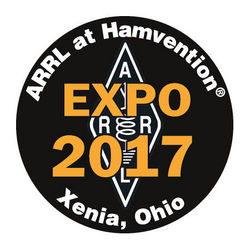 When Hamvention® opens on May 19 for the first time in Xenia, Ohio, the focus of ARRL activities will be the ARRL EXPO in Building 2 of the
When Hamvention® opens on May 19 for the first time in Xenia, Ohio, the focus of ARRL activities will be the ARRL EXPO in Building 2 of the 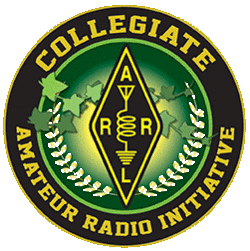 One popular forum at the Orlando HamCation focused on the ARRL Collegiate Amateur Radio Initiative (
One popular forum at the Orlando HamCation focused on the ARRL Collegiate Amateur Radio Initiative (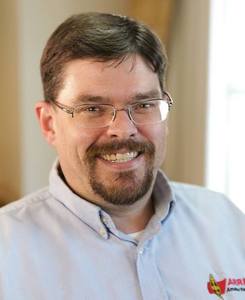
 "Through his actions, as he described them to the NYPD, Mr. Peralta has demonstrated not only a deliberate disregard of the Commission's authority and rules, but of the safety of NYPD officers and the public that they are called to serve and protect," the FCC said in a Notice of Apparent Liability (
"Through his actions, as he described them to the NYPD, Mr. Peralta has demonstrated not only a deliberate disregard of the Commission's authority and rules, but of the safety of NYPD officers and the public that they are called to serve and protect," the FCC said in a Notice of Apparent Liability (.jpg)
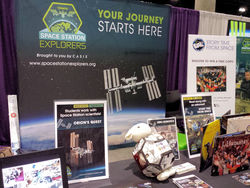 An estimated 4,000 educators visited the CASIS booth, learning what is available to engage students in ISS research and activities.
An estimated 4,000 educators visited the CASIS booth, learning what is available to engage students in ISS research and activities. The NSTA convention came on the heels of the Council of State Science Supervisors (
The NSTA convention came on the heels of the Council of State Science Supervisors (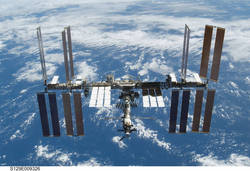 While the VHF transceiver was offline, ARISS shifted school contacts from NA1SS to the Kenwood TM-D710 transceiver in the Russian Service Module. NASA ISS Ham Project Coordinator Kenneth Ransom, N5VHO, said the VHF capability now back in Columbus can be used in conjunction with passes involving the HamTV digital amateur television (DATV) system, which operates on 2.4 GHz.
While the VHF transceiver was offline, ARISS shifted school contacts from NA1SS to the Kenwood TM-D710 transceiver in the Russian Service Module. NASA ISS Ham Project Coordinator Kenneth Ransom, N5VHO, said the VHF capability now back in Columbus can be used in conjunction with passes involving the HamTV digital amateur television (DATV) system, which operates on 2.4 GHz.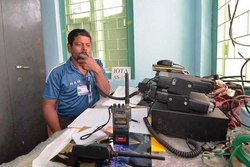
.jpg)
%20from%20Canada.jpg)
%20NASA%20logo.jpg) Schwarz said that during the 1999 solar eclipse in Europe, radio amateurs recorded long-distance contacts on 160 and 80 meters. "We want to inform all amateurs about the opportunity of experiencing the solar eclipse on a totally different level by operating radios in their shacks," he said.
Schwarz said that during the 1999 solar eclipse in Europe, radio amateurs recorded long-distance contacts on 160 and 80 meters. "We want to inform all amateurs about the opportunity of experiencing the solar eclipse on a totally different level by operating radios in their shacks," he said.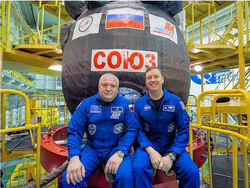
.jpg) "There has been a tremendous amount of interest in emergency preparedness since 9/11 and Katrina, and this is true for the Amateur Radio community as well," ARRL Emergency Preparedness Manager Mike Corey, KI1U, told the publication. "Emergency communications is a gateway into Amateur Radio, and many join our ranks through an interest in being better prepared themselves and as a way to serve their community."
"There has been a tremendous amount of interest in emergency preparedness since 9/11 and Katrina, and this is true for the Amateur Radio community as well," ARRL Emergency Preparedness Manager Mike Corey, KI1U, told the publication. "Emergency communications is a gateway into Amateur Radio, and many join our ranks through an interest in being better prepared themselves and as a way to serve their community."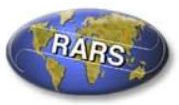 Inderbitzen, NQ1R, who represented the League at the event, said a youth-operated special event station was among the activities aimed to appeal to younger attendees. In a presentation highlighting some ARRL Second Century activities, Inderbitzen noted the ARRL Collegiate Amateur Radio Initiative, intended to bolster activity at college and university ham radio clubs.
Inderbitzen, NQ1R, who represented the League at the event, said a youth-operated special event station was among the activities aimed to appeal to younger attendees. In a presentation highlighting some ARRL Second Century activities, Inderbitzen noted the ARRL Collegiate Amateur Radio Initiative, intended to bolster activity at college and university ham radio clubs.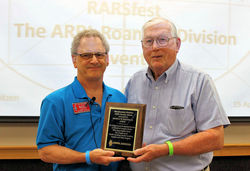
.png) Central States VHF Society Solicits Conference Papers, Presentations, Poster Displays: The Central States VHF Society (
Central States VHF Society Solicits Conference Papers, Presentations, Poster Displays: The Central States VHF Society (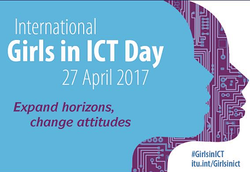 International Girls in Information and Telecommunication Technologies Day is April 27:
International Girls in Information and Telecommunication Technologies Day is April 27: 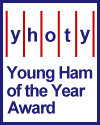 Nominations are Open for the 2017 Bill Pasternak Young Ham of the Year: Nominations for the 2017 Bill Pasternak/Amateur Radio Newsline Young Ham of the Year (
Nominations are Open for the 2017 Bill Pasternak Young Ham of the Year: Nominations for the 2017 Bill Pasternak/Amateur Radio Newsline Young Ham of the Year (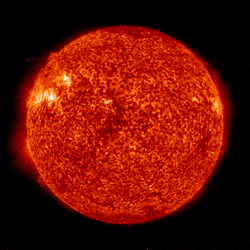 Average daily sunspot numbers declined from 16.6 last week to 8.6 over the April 13-19 reporting week. Average daily solar flux increased from 73.8 to 76.5.
Average daily sunspot numbers declined from 16.6 last week to 8.6 over the April 13-19 reporting week. Average daily solar flux increased from 73.8 to 76.5.







